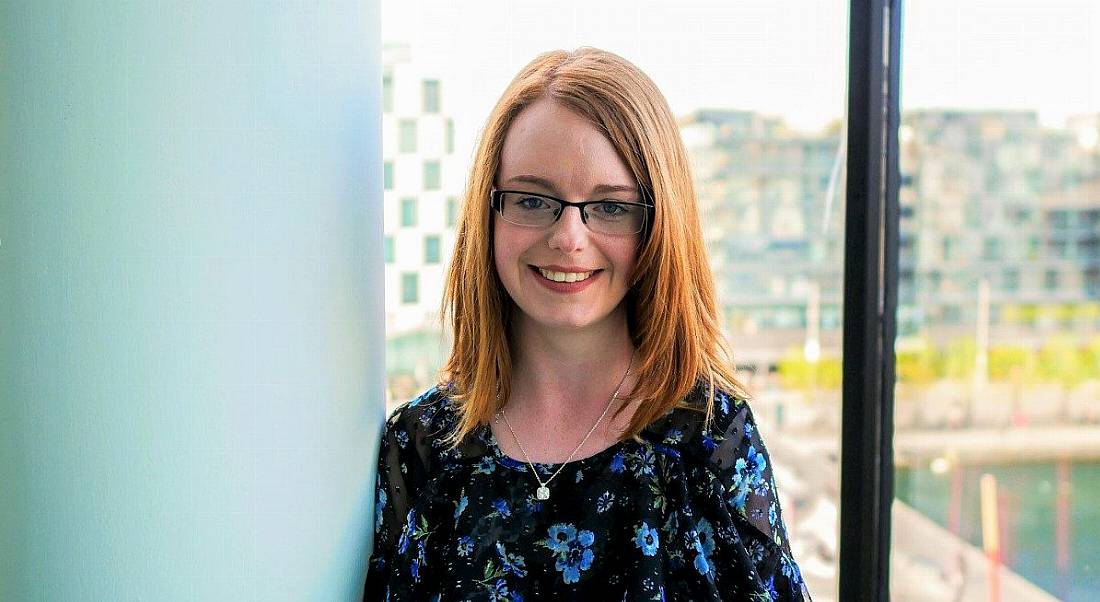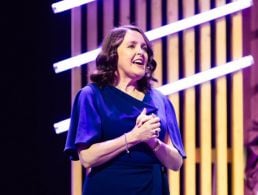Find out how the graduate programme at Accenture helped Jill Egan make the career change she thought might not be possible.
Something you often learn once you step into the world of work is that career paths aren’t always straightforward.
Jill Egan, a music graduate who is now working in business and technology integration at Accenture, can certainly attest to that.
She told Siliconrepublic.com about moving from the world of teaching to examining the quality of cutting-edge technologies such as chatbots, as well as her experiences in the company’s graduate programme.
‘I got to ease myself in and grasp the basics, before moving on to more opportunities that developed my technology skills’
– JILL EGAN
What did you study in college?
I studied music in NUI Maynooth for my bachelor’s degree, before I started working as a music teacher. I realised that teaching didn’t suit my lifestyle.
I started thinking about other options in the music industry. For example, I always enjoyed the technology behind music productions, especially in sound design. So, I decided to learn more about it.
After chatting with a friend who was doing the master’s in interactive digital media in Trinity College, I applied and was lucky to get one of the 22 places available.
It was during this course that I got my first taste of web design and programming, and I surprised myself with how much I enjoyed it!
With this programme, are you now working in your desired industry?
Although my initial plan was to work in sound design, my master’s unlocked a new-found love of technology and sparked a desire to start my career in tech.
I had heard about Accenture’s graduate programme, but I presumed I needed to have a bachelor’s in computer science to apply. Luckily, Accenture looks for people from all backgrounds and disciplines, especially in the business and technology integration stream.
The idea is that if we have 10 people in a room brainstorming ideas, and those 10 people are from diverse backgrounds and skillsets, then they are more likely to produce innovative ideas and solutions.
I joined Accenture’s technology graduate programme in 2017 as a business and integration architecture analyst. I often work with multiple teams and help manage testing tasks across a global team.
In my first two years with the company, I’ve gained experience working with a broad range of technologies, from chatbots to artificial intelligence and automation. I’ve also been promoted to senior analyst.
What drew you to Accenture when you were seeking work as a graduate?
One of the biggest attractions to work with Accenture is the people. I have never felt so comfortable in an interview environment and thoroughly enjoyed the whole application process.
The bonus of having a career counsellor to give you advice throughout your career was the icing on the cake.
What expectations did you have before you began the programme?
When I got the call to say that I was offered a place on the Accenture technology graduate programme for 2017, I wasn’t sure what to expect. I was excited at the thought of a new learning experience, but was also incredibly nervous as I didn’t feel like I had enough technical experience.
However, this all changed when I started my six weeks of training in September 2017. We were given endless opportunities to learn about the life cycle of a project.
After we finished the core curriculum, we could use Accenture’s on-demand learning portal to explore hundreds of different courses from artificial intelligence to Google Cloud Platform.
What duties and responsibilities were you given initially?
In the beginning, my duties mainly consisted of reporting on quality and rolling out a standardised process across all locations on my team. I also helped prepare quarterly business reviews.
During my early months, my team didn’t want to overwhelm me with technology-related content and tasks. Instead, I got to ease myself in and grasp the basics, before moving on to more opportunities that developed my technology skills.
Did the scope of your work change as the programme progressed?
As the programme progressed, I became more confident in my work and was given the freedom to find areas of improvement across the team’s existing operations and processes.
For example, my reporting task was quite manual, so I jumped at the opportunity to automate the process. I used a mixture of SQL, HTML, CSS and Jinja2 to achieve this.
As time went on, I got the wonderful opportunity to move onto a team that primarily dealt with the manual testing of chatbots, which are a bit like Siri on iPhones. I’m still working with this team.
Can you describe a typical day in your role?
In general, my work is involved in the quality assurance stage of software development and deployment to ensure there are no bugs or issues.
I check my emails every morning to see if there are any updates or issues from the testers. I then check the testing queues and see if any new test requests have been added to the list. I add any new requests into a spreadsheet, colour code it and assign it to a point of contact. This depends on what locales are required and what devices are to be tested.
If I’m sending out a new test request, I would typically make sure that the test cases are correct by getting a tester to troubleshoot it. Sometimes the ones which look easy can be the most difficult!
Once the request has been checked over, I would make sure the bug template is properly created in case of any issues. Then I write an email to the testers and monitor the testing to make sure it gets solved on time.
If any issues or queries pop up, I try to help the testers find a solution and pass the message onto the leads.
How do your responsibilities compare to more experienced employees?
The main difference is that more experienced employees often tend to deal directly with our client stakeholders. They would discuss deadlines if we have any issues in testing and advise if we ran into any issues with the testers.
Do you feel more prepared for working life after completing this programme?
Yes, the programme has given me experience in areas I never thought possible. I have worked as a business analyst across multiple teams and have also helped manage testing tasks across a global team.
I never even knew what testing involved before this or what a business analyst did. I also have a new passion for artificial intelligence and automation.
Since I began the graduate programme, I’ve had the opportunity to train abroad in these two areas. Without Accenture, and such supportive managers and career counsellors, I would never have had the chance to do this.
Why should someone apply to the graduate programme at Accenture?
Recent and soon-to-be grads should apply to Accenture’s graduate programme for many reasons, the main one being the opportunity to learn. The teams honestly don’t mind what your background or degree is once you have a passion for technology.
I applied to multiple graduate programmes in the hopes that someone would see my passion to learn and Accenture gave me the opportunity to try out new areas, and to learn and develop. Other graduate opportunities in technology required at least a bachelor’s degree in computer science, which I did not have.
Another reason to apply is the people. The people truly make it a wonderful company to work for as they really care about your learning and wellbeing.




